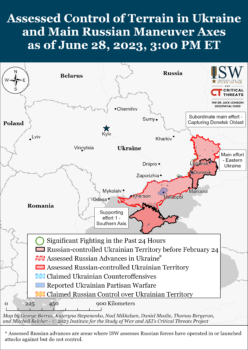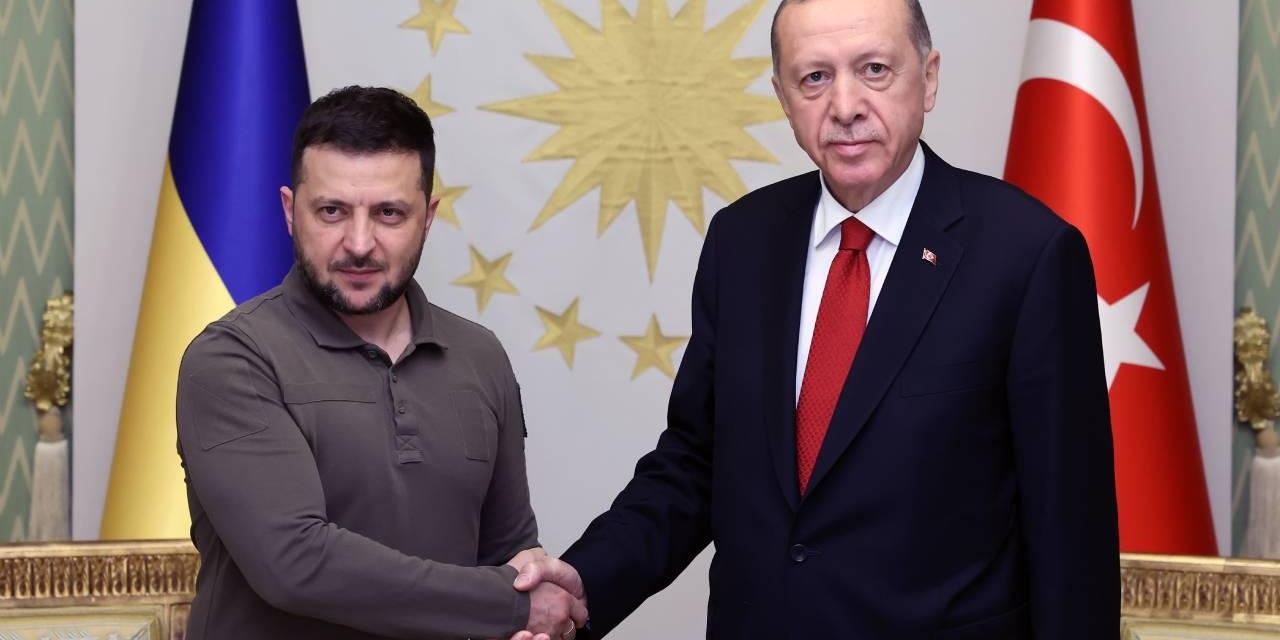Ukraine President Volodymyr Zelenskiy and Turkish counterpart Recep Tayyip Erdoğan, July 7, 2023
EA on BBC Radio Scotland and India’s WION News: Ukraine and Cluster Munitions
Friday’s Coverage: Zelenskiy’s Diplomatic Tour Ahead of NATO Summit

Map: Institute for Study of War
UPDATE 1811 GMT:
Russia is complaining about the return of five Ukrainian commanders, all former prisoners of war, to Ukraine from Turkey.
The men were involved in a prisoner exchange brokered by Ankara last year. Under the terms, commanders were to stay in Turkey until the end of the war.
President Zelenskiy tweeted a video of the men, who led the defense of the port city of Mariupol during 12 weeks of Russian bombing, ground attacks, and siege from the start of the invasion until May 2022.
Повертаємося додому з Туреччини й повертаємо додому наших героїв.
Українські воїни Денис Прокопенко, Святослав Паламар, Сергій Волинський, Олег Хоменко, Денис Шлега нарешті будуть із рідними.
Слава Україні!——
We are returning home from Türkiye and bringing our heroes home.… pic.twitter.com/SLX3RIWPiy
— Володимир Зеленський (@ZelenskyyUa) July 8, 2023
“The return of the leaders of the Azovites from Turkey to Ukraine is nothing more than a direct violation of the terms of the existing agreements,” snapped Kremlin spokesman Dmitry Peskov.
UPDATE 1759 GMT:
Some of Ukraine’s international partners have criticized the US supply of cluster munitions to Kyiv.
Spanish Defense Minister Margarita Robles told reporters in Madrid:
pain, based on the firm commitment it has with Ukraine, also has a firm commitment that certain weapons and bombs cannot be delivered under any circumstances.
No to cluster bombs and yes to the legitimate defense of Ukraine, which we understand should not be carried out with cluster bombs.
Canada’s government referred in a statement to the 2008 convention, supported by more than 130 countries, barring the use of the munitions:
We do not support the use of cluster munitions and are committed to putting an end to the effects cluster munitions have on civilians, particularly children.
Canada is fully compliant with the Convention and we take seriously our obligation under the Convention to encourage its universal adoption.
UK Prime Minister Rishi Sunak also cited the Convention while emphasizing, “We will continue to do our part to support Ukraine against Russia’s illegal and unprovoked invasion.”
UPDATE 1148 GMT:
At least 494 children have been killed and 1,051 injured during Russia’s invasion, says the office of Ukraine’s Prosecutor General.
Most of the victims were in the Donetsk and Kharkiv regions,. Others are in regions such as Kyiv, Kherson, Zaporizhzhia, and Mykolaiv.
Officials emphasized that the actual toll is far higher.
These are not the final numbers. Work is ongoing to establish the data in combat zones, as well as in the temporarily occupied and liberated territories.
UPDATE 1144 GMT:
The toll from this morning’s Russian rocket strike on Lyman in eastern Ukraine (see 1014 GMT) has risen to eight killed and 13 wounded.
UPDATE 1050 GMT:
UK military intelligence echoes the Institute for the Study of War’s assessment of “tactically significant gains” by Ukraine’s counter-offensive (see 0627 GMT).
The British analysts note “steady” advances both north and south of Bakhmut in the Donetsk Region, evaluating, “Russian defenders are highly likely struggling with poor morale, a mix of disparate units, and a limited ability to find and strike Ukrainian artillery.”
As ISW notes Russia’s diversion of forces from the east to the south, UK military intelligence says it is “highly likely” that Moscow “has few additional reserves to commit” to Bakhmut.
UPDATE 1037 GMT:
Ukraine Defense Minister Oleksii Reznikov says Kyiv will abide by five principles in its use of cluster munitions supplied by the US.
- Ukraine forces will only use the munitions for the liberation of territory. Munitions will not be usec on Russian territory.
- There will be no use in urban areas. Munitions will only be used against concentrations of Russian forces, to break through defensive lines.
- A strict record will be kept of the use of the munitions.
- Territories which are liberated will be given priority for demining.
- Ukraine will report to our partners about the use of the munitions.
UPDATE 1014 GMT:
Russian rockets have killed at least six people and injured five in Lyman in eastern Ukraine.
Donetsk Governor Pavlo Kyrylenko said the city, liberated by Ukrainian forces last September, was struck at 10 a.m. A house and shop were damaged.
The Ukrainian military said it repelled a Russian assault near the key railway junction.
UPDATE 0940 GMT:
Ukraine President Volodymyr Zelenskiy has visited Zmiinyi (Snake) Island, a symbol of resistance to the Russian invasion.
In footage released on Saturday, Zelenskiy laid flowers at a memorial:
Today we are on Snake Island, which will never be conquered by the occupiers, like the whole of Ukraine, because we are the country of the brave.
I want to thank from here, from this place of victory, each of our soldiers for these 500 days.
President of Ukraine Volodymyr #Zelenskyy visited the Snake Island and paid tribute to the memory of the fallen defenders. pic.twitter.com/fh3UK6KqcZ
— NEXTA (@nexta_tv) July 8, 2023
Russian forces attacked the island within hours of the launch of Vladimir Putin’s invasion on February 24, 2022. Responding to demands for their surrender, Ukrainian defenders replied, “Go fuck yourself, Russian warship.”
The defiance became a marker of Ukraine’s stand against the Russians as the invaders failed to overrun Kyiv and other cities in the spring, and then had to withdraw from northern Ukraine.
The defenders were later exchanged for captured Russian troops. The Russian warship, Moscow’s Black Sea flagship Moskva, was sunk by Ukrainian missiles in April.
Snake Island was liberated in June 2022.
Zelenskiy’s Chief of Staff Andriy Yermak posted on Twitter:
The night is always darkest before the dawn. This dawn on the Snake Island was inspiring.
Along with the President and the team, we visited the place of 🇺🇦 victory.
500 days… 9 years of war…
The Snake Island is a symbol of 🇺🇦's invincibility.We will get everything back🌅 pic.twitter.com/kolgozulGk
— Andriy Yermak (@AndriyYermak) July 8, 2023
UPDATE 0627 GMT:
The Institute for the Study of War summarizes “tactically significant gains” by Ukraine’s counter-offensive on the eastern front on Thursday.
The US-based analysts cite geolocated video that indicates Ukrainian advances near Yahidne, 2 km north of the city of Bakhmut.
The Ukrainian military noted further gains both to the north and south of Bakhmut, seized by Russian forces and mercenaries in May after a year-long assault.
A spokesperson for the Ukraine General Staff, Andriy Kovalev, cited “partial success” near the village of Klishchiivka, southwest of the city.
Another spokesman, Serhiy Cherevatyi, said, “The [Ukraine] defense forces continue to hold the initiative there, putting pressure on the enemy, conducting assault operations, advancing along the northern and southern flanks.”
The ISW notes that Moscow has reported “committed almost the entirety of the Russian Eastern Grouping” of armed forces to the southern front, trying to prevent further Ukrainian advances.
They add that this “suggests that Russian defenses in southern Ukraine may be brittle”.
Russian defenses in southern Ukraine, while formidable, are not insurmountable. Russian forces in southern Ukraine would likely have to fall back on prepared defensive positions without significant support from operational reserves if Ukrainian forces achieved an operational breakthrough.
Withdrawal in contact is an exceedingly difficult military task, and it is unclear that Russian forces in contact would be able to successfully withdraw from their first lines to other prepared lines in good order, especially if those forces – and the forces behind them in echelon – are worn-down and unsupported.
UPDATE 0619 GMT:
Ukraine President Volodymyr Zelenskiy has thanked the Biden Administration for the latest $800 million package of military assistance.
The aid includes cluster munitions, Bradley and Stryker armored vehicles, and ammunition for howitzers and the High Mobility Artillery Rocket System.
A timely, broad and much-needed defense aid package from the United States. We are grateful to the American people and President Joseph Biden @POTUS for decisive steps that bring Ukraine closer to victory over the enemy, and democracy to victory over dictatorship. The expansion…
— Володимир Зеленський (@ZelenskyyUa) July 7, 2023
ORIGINAL ENTRY: Even as it blocks Sweden’s accession in NATO, Turkey has backed Ukraine’s membership.
In a diplomatic tour that has also included Bulgaria, the Czech Republic, and Slovakia, Ukraine President Volodymyr Zelenskiy met Turkish counterpart Recep Tayyip Erdoğan in Istanbul on Friday.
Erdoğan said at a joint press conference with Zelenskiy, “There is no doubt that Ukraine deserves membership of NATO.”
The Ukrainian President responded, “I am grateful to Turkey for its constant support of Ukraine’s territorial integrity and sovereignty. I believe that, together, we can do even more, saving lives and protecting stability.”
He noted the signature of new military production agreements, including for the manufacturing of drones. He “invited Turkey to join the large-scale work to rebuild Ukraine, its reconstruction, and transformation”.
The two men also discussed Russia’s latest threat to break the July 2022 deal, brokered by Turkey and the UN, lifting Moscow’s blockade of three Ukrainian Black Sea ports. The agreement expires on July 18 unless there is another extension.
Erdoğan said he would press the issue when Vladimir Putin visits Turkey next month:
Our hope is that it will be extended at least once every three months, not every two months. We will make an effort in this regard and try to increase the duration of it to two years.
The discussion also covered the Ukrainian counter-offensive to liberate territory in the south and east, and Zelenskiy’s “peace formula” to end the Russian invasion.
Türkiye 🇺🇦🇹🇷.
Meeting with President Recep Tayyip Erdoğan @RTErdogan. Very important negotiations.Security – both in our Black Sea region and Europe in general. I am grateful for the support of Ukraine's territorial integrity and sovereignty. Peace Formula. Protection of our… pic.twitter.com/FfsniYKZ7q
— Володимир Зеленський (@ZelenskyyUa) July 7, 2023

